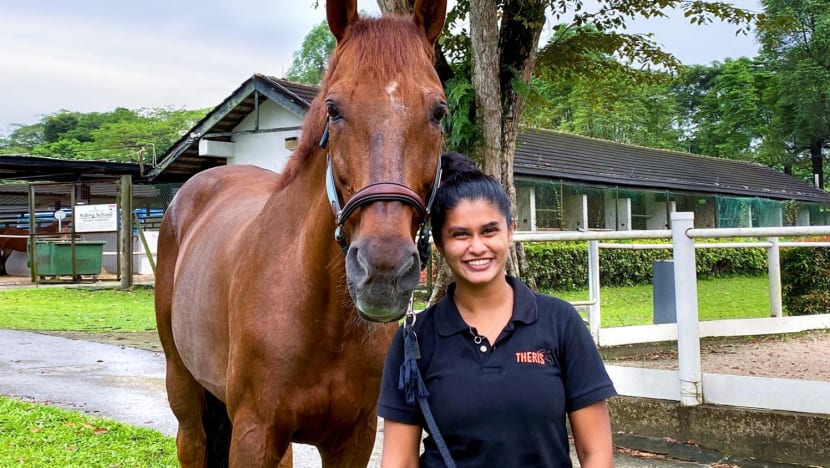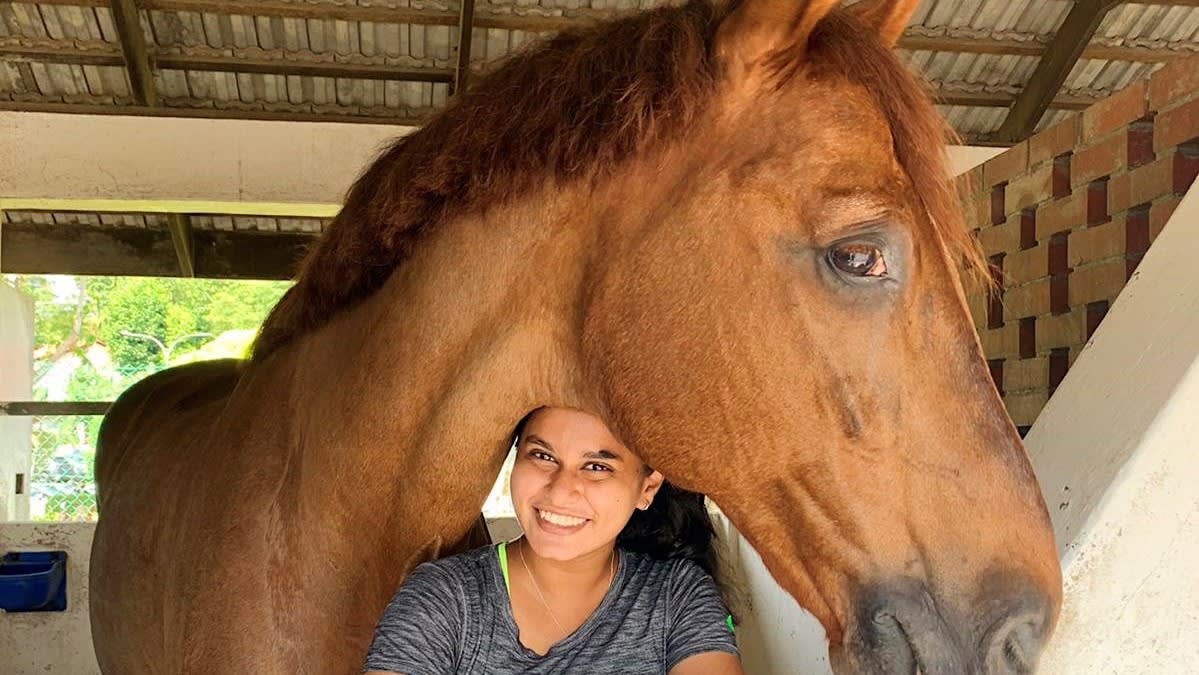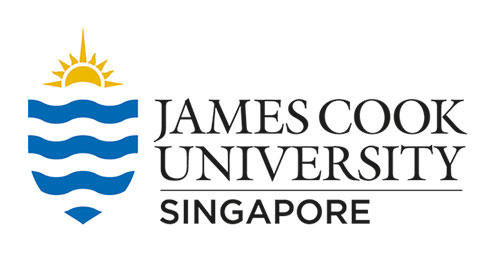Riding into a career as an equine-assisted therapist
Not all psychology graduates work indoors. James Cook University alumna Lavannya Sivanandan discovered the world of equine therapy through an internship that would change her life.

Ms Lavannya Sivanandan works alongside horses to organise and execute individualised equine-assisted therapy services for clients. Photos: Lavannya Sivanandan
Working with clients who have special needs or physical disabilities requires a sensitive touch. But Ms Lavannya Sivanandan’s partners aren’t quite your typical therapy aides. They may exhale hot air over your head or even snort loudly in the middle of a session.
And that’s because they’re horses. Ms Lavannya is an equine-assisted therapist at Therapeutic & Educational Riding in Singapore (THERIS), an organisation where psychology-trained employees work alongside horses to improve clients’ well-being.
Ms Lavannya got her start in the field at the Singapore campus of James Cook University (JCU). In 2017, she enrolled in the Bachelor of Psychological Science programme after graduating from a local polytechnic with a Diploma with Merit in Integrated Events Management. Despite her choice of diploma, Ms Lavannya has always been interested in psychology, and a family friend who is a psychologist recommended JCU and its curriculum to her.
“I’ve always had a strong passion for supporting individuals around me, partly because I grew up with a brother who has special needs,” shared Ms Lavannya. “I also find it intriguing how and why we behave or think in a particular manner, which has led me to pursue psychology as a field of study and a career.”
A HOLISTIC STRUCTURE TO STUDIES
Ms Lavannya was drawn to JCU because of the opportunity to study at the university’s Australian campus, as well as the autonomy to select the number of modules per trimester.
She explained: “Because I had to juggle work as a freelance nanny and my studies, having the ability to pick the number of modules was a benefit. I viewed my studies seriously and did not want to miss out or rush through modules just to attain a pass.”
Ms Lavannya also found JCU’s trimester system more efficient, compared to traditional university calendars with long-term breaks that could potentially disrupt her studying pace.
As a local polytechnic graduate, Ms Lavannya could apply for exemption for her previous diploma study. Other degree holders are also eligible for elective exemptions. Accredited by the Australian Psychology Accreditation Council, the Bachelor of Psychological Science at JCU serves as a pathway to other post-graduate psychology programmes and is available in full-time and part-time modes.
DISCOVERING A PASSION FOR EQUINE-ASSISTED THERAPY

While she was unable to take up JCU’s exchange programme in the end due to the COVID-19 pandemic, Ms Lavannya’s university experience was livened up by her active participation in campus events and student-led associations.
Besides taking up volunteering opportunities, she tapped on her events management knowledge to create and lead psychology-oriented events focusing on areas such as COVID-19 isolation recovery, LGBTQ+ awareness, suicide prevention and anxiety awareness. Often, this involved liaising with other organisations and universities on behalf of JCU’s Psychology Society, of which she eventually became president.
“It was during one of those events that I got to meet Ms Jessamine Ihrcke Dorsey, managing director and founder of THERIS, and Dr Ameerah Mattar, its senior equine-assisted therapist,” she recounted. “I told them about my background and how my studies in psychology could merge well with equine-assisted therapy.”
Discovering that she resonated deeply with their values and beliefs, Ms Lavannya took up an extended internship with them. She later became an equine-assisted therapist after her graduation from JCU in 2020.
“I work alongside horses to organise and execute individualised equine-assisted therapy services for clients,” she said of her duties. “I have encountered clients who come from homes in which they do not feel safe, or children who are bullied and unable to open themselves up to others easily or who want a safe space to spend time and feel understood.”
Having put in the effort to build a strong relationship with the horses at THERIS, Ms Lavannya relies on them and her JCU education to facilitate her work with clients.
“Having an empathetic ear coupled with the knowledge and training I’ve received has made me more equipped to address a wider range of clients’ needs,” she said.
GIVING BACK THROUGH HER WORK
Ms Lavannya was also inspired by JCU’s lecturers, who often shared personal experiences to provide relevant insights and encouraged students to approach them for guidance when needed.
She said: “Some of the lecturers who inspired me greatly were Dr Peter Chew and Dr Ai Ni Teoh. I enjoyed observing how they adapted their modes of teaching by coming up with alternative methods to help anyone who was struggling. They were open to being reached out to, via email or in person, to discuss a topic while providing us with resources to ensure we understood the concepts. Since graduation, I have made a conscious effort to apply these practices to how I conduct my therapy sessions.”
Her advice to aspiring JCU psychology students is to seek ways to give back to the community, via volunteering or internships. “Along with building connections, this will provide you with real-world experiences to apply your knowledge and expand your scope of understanding.”
Not pigeon-holing yourself early is also important, she added. “Explore what’s out there and find a path that fits with who you are. When I first got into psychology, I had never even heard about equine-assisted therapy. Now, it has become my passion and my career. I hope that you, too, will find a path that speaks to you.”
JCU’s Bachelor of Psychological Science programme is accredited by the Australian Psychology Accreditation Council. Visit the Continuing Education website to find out more about other part-time programmes offered at the Singapore campus of JCU.















